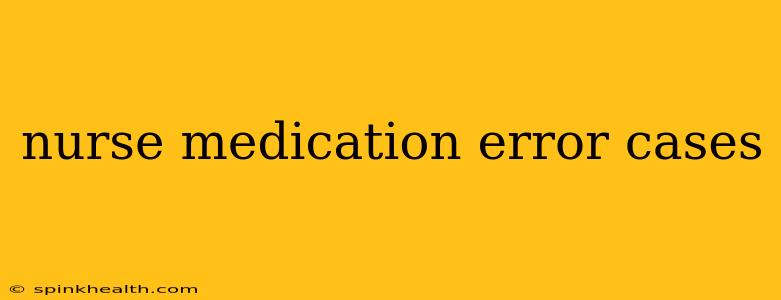Medication errors are a stark reality within the healthcare system, and nurses, being at the forefront of patient care, often bear the brunt of their consequences. This isn't about assigning blame, but about understanding the systemic issues that contribute to these errors and exploring strategies for prevention. This exploration will delve into real-world examples, common causes, and the crucial role of reporting in improving patient safety.
What are the most common types of medication errors made by nurses?
This is a critical question, and unfortunately, there's no single, definitive answer. The variety of medications, administration routes, and patient conditions creates a complex landscape of potential errors. However, some patterns emerge consistently. Many errors involve wrong dosage, wrong medication, wrong time of administration, or even wrong route of administration. Think about a scenario where a nurse, amidst a busy shift, mistakenly administers twice the prescribed dose of a powerful painkiller. The consequences could range from mild discomfort to severe organ damage, even death. Similarly, giving the wrong medication altogether – perhaps confusing two similarly-packaged drugs – can have devastating results. These errors highlight the importance of meticulous attention to detail and robust double-checking mechanisms. Beyond these, omission errors (forgetting to administer a dose) are also tragically common.
What are the consequences of medication errors made by nurses?
The consequences of medication errors can be catastrophic, both for the patient and the nurse involved. For patients, the effects can range from minor discomfort and delayed recovery to severe organ damage, permanent disability, and even death. The psychological trauma for both the patient and their family is immeasurable. For the nurse, the repercussions can include disciplinary action, loss of license, legal repercussions, and significant emotional distress. This emotional toll is often overlooked; the weight of responsibility and the potential for harm can be incredibly stressful. The impact extends beyond the individual, affecting the entire healthcare team and the trust patients place in the system.
How can medication errors by nurses be prevented?
Preventing medication errors requires a multi-pronged approach. It starts with robust education and training, emphasizing the importance of meticulous attention to detail, double-checking, and understanding medication interactions. Technology plays a vital role. Barcode scanning systems, electronic medication administration records (eMARs), and computerized physician order entry (CPOE) can significantly reduce the chance of human error. Furthermore, creating a culture of safety where reporting errors without fear of blame is encouraged is paramount. Open communication between nurses, physicians, and pharmacists is crucial for identifying and addressing potential issues promptly. Regular audits and quality improvement initiatives help identify trends and implement necessary changes.
What legal implications are there for nurses who make medication errors?
The legal implications depend heavily on the severity of the error and the resulting harm to the patient. Minor errors may result in warnings or retraining, while serious errors resulting in patient harm can lead to disciplinary action from licensing boards, civil lawsuits, and even criminal charges in extreme cases. The legal landscape is complex and varies by jurisdiction. It's crucial for nurses to understand their responsibilities and the legal framework surrounding medication administration. Maintaining thorough documentation and adhering to established protocols are essential in minimizing legal risks.
Are there any specific cases of nurse medication errors that have made headlines?
While specific details of individual cases are often kept confidential to protect patient privacy, the media occasionally reports on high-profile instances. These cases often highlight systemic issues within the healthcare system, such as understaffing, inadequate training, or flawed processes. While details remain private, it is important to remember that these incidents underscore the need for continued improvement in patient safety protocols. Analyzing these cases (with appropriate anonymization) allows for the development of better preventative measures.
What resources are available to nurses to prevent medication errors?
Numerous resources are available to nurses to prevent medication errors. Professional nursing organizations offer continuing education courses and workshops focused on medication safety. Many hospitals and healthcare systems provide internal training programs and resources. Furthermore, online resources, journals, and government agencies publish guidelines and best practices. Staying updated on the latest research and best practices is crucial for maintaining competence and minimizing risks.
This journey into the world of nurse medication errors underscores the complexity of the issue and the importance of a collaborative approach to prevention. It's not about individual blame, but about recognizing the systemic factors, implementing preventative measures, and fostering a culture of safety within healthcare. The ultimate goal is to ensure that every patient receives the correct medication, at the right dose, at the right time, in the right way – every time.

